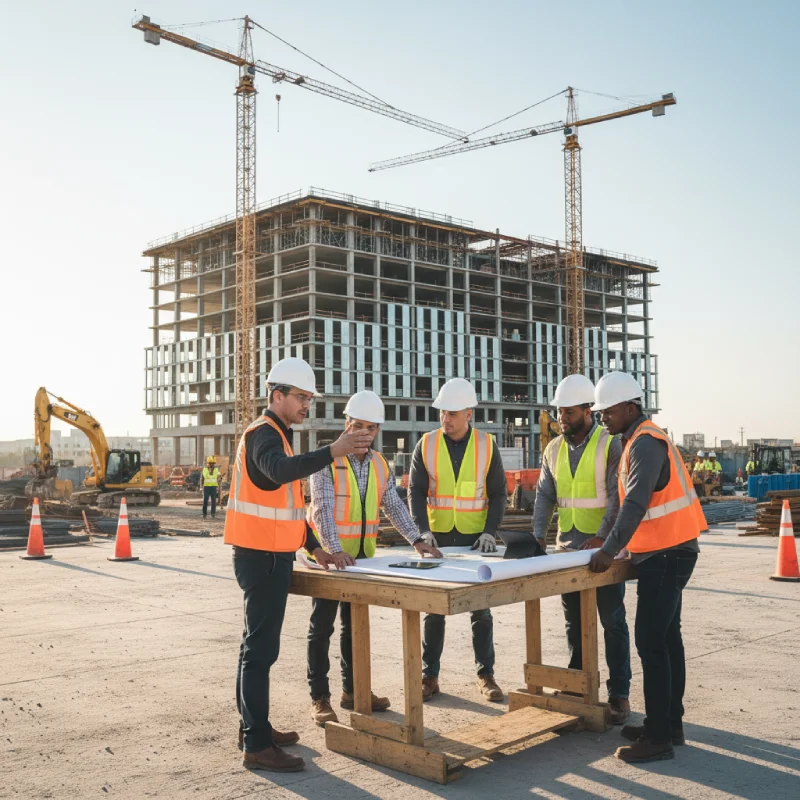
A general contractor serves as the central coordinator who manages all aspects of a commercial construction project, from initial planning and budgeting to subcontractor oversight, regulatory compliance, and final quality inspections.
Building something significant requires more than just materials and muscle—it requires someone who can bring together the right people, manage countless moving parts, and keep everything on track. That's where general contractors come in. For commercial projects, they're the ones who transform blueprints into buildings, coordinate teams, and make sure your investment delivers the results you expect.
Whether you're planning an office buildout, retail space, or multi-story development here in North Texas, understanding what general contractors actually do helps you choose the right partner for your project.
Before the first shovel hits dirt, general contractors lead the planning phase that determines whether your project makes sense—and if so, how to build it right. This includes site evaluations, zoning reviews, and assessing environmental factors that could impact construction.
Smart contractors identify potential problems early. They look at soil conditions, utility access, and infrastructure connections. They review local regulations and secure preliminary approvals. This isn't about finding reasons to say "no"—it's about spotting challenges before they become expensive surprises.
General contractors work with your design team to balance what you want with what's practical and budget-friendly. According to FEMA's Risk Management guidance, comprehensive risk identification and planning during early project phases significantly reduces complications. They suggest alternatives when needed, recommend materials that deliver better long-term value, and help you make informed decisions about where to invest your construction dollars.
Once planning wraps up, general contractors develop detailed schedules that break complex projects into manageable phases. Every task gets assigned with clear deadlines and accountability measures.
Modern contractors use sophisticated tracking systems that provide real-time visibility into construction progress. This means potential delays get spotted and addressed before they cascade into bigger problems.
Contractors identify which activities directly impact your completion date using Critical Path Method analysis. This shows task dependencies and helps prioritize resources where they matter most. Weather buffers, milestone tracking, and lookahead scheduling (mapping 2-6 week work sequences) keep projects moving forward steadily.
Your general contractor doesn't do every task themselves—they coordinate specialists who handle electrical, plumbing, HVAC, and other trades. Selecting the right subcontractors makes or breaks project quality.
Key evaluation factors include:
General contractors maintain ongoing relationships with reliable subs. When you see the same crews showing up project after project, that consistency translates into better coordination and quality workmanship.
Effective budget management starts with thorough cost analysis during planning. General contractors break down expenses into direct costs (materials, labor) and indirect costs (permits, insurance, temporary facilities).
| Budget Component | Control Strategy |
| Direct Costs | Real-time expense tracking |
| Indirect Costs | Historical data benchmarking |
| Contingencies | Regular forecast updates |
| Change Orders | Detailed deviation logs |
Continuous monitoring compares actual expenses against estimates throughout construction. Research from MDPI's Construction Management Journal demonstrates that projects with robust cost-tracking systems and proactive monitoring experience significantly fewer budget overruns. When changes occur, contractors document everything and communicate impacts to your bottom line before proceeding.
Construction involves multiple jurisdictions and regulatory agencies. General contractors coordinate with building departments, secure necessary permits, and schedule required inspections.
They stay current with evolving codes—OSHA safety standards, environmental regulations, building codes, and local zoning requirements. This knowledge prevents work stoppages and failed inspections that derail timelines.
Critical compliance areas:
General contractors orchestrate daily activities across multiple trades. They schedule material deliveries, coordinate equipment usage, and conduct regular site inspections to monitor quality and progress.
Communication happens through daily meetings where subcontractors, suppliers, and stakeholders align on priorities. Contractors prevent trade conflicts (like having electricians trip over plumbers), optimize workflow sequences, and maintain project momentum through proactive problem-solving.
Quality assurance processes monitor every construction phase, from material selection through final inspections. General contractors establish systematic protocols that include:
Regular onsite inspections verify work meets specifications. Detailed checklists ensure nothing gets overlooked. Quality metrics track performance throughout the project, providing measurable data for continuous improvement.
Worker safety isn't optional—it's fundamental. Contractors implement comprehensive training programs, conduct regular hazard assessments, and maintain emergency preparedness protocols. Clear enforcement policies define responsibilities and consequences for non-compliance.
Advanced monitoring systems now include environmental sensors tracking dust, noise, and air quality across jobsites. Automated documentation consolidates compliance data into centralized dashboards, giving stakeholders instant visibility into safety performance.
The general contractor serves as your central point of contact, connecting you with designers, subcontractors, and suppliers. They implement project management platforms that centralize documentation and create clear communication channels.
Research shows poor communication causes over 30% of project failures. That's why experienced contractors establish detailed communication plans outlining roles, responsibilities, and information flow from day one.
When problems arise—and they will on any significant project—contractors facilitate resolution by bringing together the right people, documenting decisions, and maintaining clear audit trails. This proactive approach prevents costly rework and keeps projects moving forward.
A general contractor typically holds the construction contract and assumes risk for project delivery, while a construction manager often works in an advisory capacity without taking on construction risk. General contractors coordinate all trades and subcontractors directly.
When unforeseen issues arise (like poor soil or hidden utilities), contractors document the conditions, assess impacts on schedule and budget, present options to the owner, and implement approved solutions. Change order processes track all modifications.
Verify their experience with similar project types, check references from past clients, review their safety records, confirm insurance coverage, and assess their financial stability. Long-term relationships with subcontractors and suppliers indicate reliability.
That depends on your preference and the contract structure. Most contractors schedule regular progress meetings (weekly or bi-weekly) and maintain open communication channels. You'll make decisions on selections, approve change orders, and participate in milestone reviews.
Well-structured contracts define how overruns are handled. Contractors should provide early warning when issues arise and document causes (owner changes vs. unforeseen conditions). Contingency funds in the original budget help absorb minor variations without derailing the project.
General contractors bring structure to the complexity of commercial construction. They coordinate planning, manage budgets, oversee quality, ensure safety, and keep communication flowing among all stakeholders. Their comprehensive oversight transforms architectural visions into functional buildings that serve your business needs.
When you're ready to move forward with your commercial project here in North Texas, choosing the right general contractor sets the foundation for success. Look for partners who demonstrate experience, maintain transparent communication, and prioritize quality workmanship.
Ready to discuss your commercial construction project? Reach out to learn how experienced contractors can help bring your vision to reality while protecting your investment every step of the way.

Whether you’re remodeling a home, expanding a business, or starting from the ground up, TriStar Built is here to guide you every step of the way. With a focus on craftsmanship, communication, and results that last, we make the construction process clear, smooth, and worth every investment.

LOCATION: 2126 James Street, Denton, TX 76205
PHONE: (940) 381-2222
© 2025 TRISTAR BUILT - ALL RIGHTS RESERVED | WEB DESIGN & SEO BY: Authority Solutions®